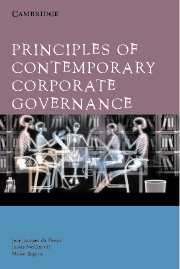Book contents
- Frontmatter
- Contents
- Table of cases
- Table of statutes
- Preface
- PART ONE CORPORATE GOVERNANCE: AN OVERVIEW
- 1 The concept ‘corporate governance’ and essential corporate governance principles
- 2 Stakeholders in corporate governance
- 3 Board functions and structures
- 4 Types of company directors and officers
- PART TWO CORPORATE GOVERNANCE IN AUSTRALIA
- PART THREE CORPORATE GOVERNANCE IN PRACTICE
- PART FOUR CORPORATE GOVERNANCE: AN INTERNATIONAL PERSPECTIVE
- PART FIVE CORPORATE GOVERNANCE: GOING FORWARD
- Index
4 - Types of company directors and officers
- Frontmatter
- Contents
- Table of cases
- Table of statutes
- Preface
- PART ONE CORPORATE GOVERNANCE: AN OVERVIEW
- 1 The concept ‘corporate governance’ and essential corporate governance principles
- 2 Stakeholders in corporate governance
- 3 Board functions and structures
- 4 Types of company directors and officers
- PART TWO CORPORATE GOVERNANCE IN AUSTRALIA
- PART THREE CORPORATE GOVERNANCE IN PRACTICE
- PART FOUR CORPORATE GOVERNANCE: AN INTERNATIONAL PERSPECTIVE
- PART FIVE CORPORATE GOVERNANCE: GOING FORWARD
- Index
Summary
The key directors on our board all know what I have done to make our company perform. They made me the CEO because I was the best candidate they could find. I have worked my butt off at great sacrifice to my family and personal life to transform this company and make it perform better than it ever had before. I don't need any of their penetrating questions or second-guessing. Thanks to my own tough bargaining, I am financially secure and set for life. If they can get someone better than me to do the job, then that's what they should do. Until then let them back off and stay out of my way.
David SR Leighton and Donald H Thain, Making Boards Work, Whitby, Ontario, McGraw-Hill Ryerson Ltd, (1997) 6 (quote from an anonymous sceptical Canadian CEO).We trained hard – but every time we were beginning to form up into teams, we would be reorganised. I was to learn later in life that we tend to meet any new situation by reorganising, and [what] a wonderful method it can be for creating the illusion of progress while producing confusion, inefficiency and demoralisation.
The famous words of Roman writer Gaius Petronius: Petronii Arbitri Satyricon, AD 66 as quoted by Nigel Kendall and Arthur Kendall, Real-World Corporate Governance, London, Pitman Publishing (1998) 212.Definition of ‘director’
De jure and de facto directors covered
The corporations laws of most common law jurisdictions contain a definition of ‘director’.
- Type
- Chapter
- Information
- Principles of Contemporary Corporate Governance , pp. 70 - 87Publisher: Cambridge University PressPrint publication year: 2005



